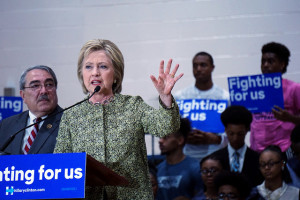
Hillary Clinton speaking in Durham, NC
Hillary Clinton gave a speech in Madison, Wisconsin on Monday, in which she blasted Republicans for refusing to consider President Barack Obama‘s U.S. Supreme Court nominee, Merrick Garland. Likewise, Clinton has released a new ad focusing on New Yorkers, and specifically attacking Donald Trump. Clinton’s new focus on Trump, the Republicans and Supreme Court nominations — one of a president’s most important Constitutional powers — seems to represent a shift from the presidential primaries to the general election.
If so, Clinton’s shift to a general election focus has likely occurred for a couple of principal reasons. First, the cold hard delegate math indicates that the path of her Democratic Party primary opponent, Bernie Sanders, to the nomination is “nearly impossible.” While Sanders supporters were jubilant after Sanders’ recent big wins in Washington, Alaska and Hawaii, all three states held caucuses rather than primaries. Moreover, those three big wins only netted Sanders approximately 35 pledged delegates, barely making a dent in Clinton’s solid lead, which stands at about 268 pledged delegates. As even Sanders devotee Rachel Maddow pointed out on her MSNBC show on Monday night, Sanders has done better than Clinton in caucuses, but there are only two caucuses left, Wyoming and North Dakota. We would add that (1) those caucus states where Sanders does better tend to have a small number of delegates; and (2) big delegate states coming up, such as New York, Connecticut, Maryland and Pennsylvania, have closed primaries where only Democrats can vote, thus making it unlikely or impossible for Republican and Independent voters to cross over and vote for Sanders to make mischief in the Democratic Party, or for complacent Hillary Clinton supporters to cross over and vote in the Republican primary, both of which happened in Michigan.
Second, the Sanders campaign increasingly is going off the rails. Evidence of this includes the Sanders campaign’s hypocritical about-face regarding so-called “super delegates,” as well as campaign surrogate Susan Sarandon‘s divisive statement that, if Sanders does not win the nomination, she might not be able to vote for Clinton, and that a Trump victory might be the “revolution” that America needs. Recall that Sarandon in 2000 also supported the presidential candidacy of Ralph Nader, who gave us President George W. Bush and Vice President Dick Cheney. Likewise, the spin from the Sanders campaign is becoming increasingly ludicrous. As Rachel Maddow also pointed out on Monday night, the Sanders campaign’s post hoc explanation that Sanders didn’t compete in all those Super Tuesday states that he lost (Texas, Alabama, Tennessee, Virginia, etc.) is “bull puckey.”
Hillary Clinton likely sees what many Democrats are seeing: a Sanders campaign that is beginning to unravel by itself, highlighting the need to turn their attention to the general election and the Republicans.
Photo by Nathania Johnson, used under Creative Commons license. http://is.gd/Alp83c


